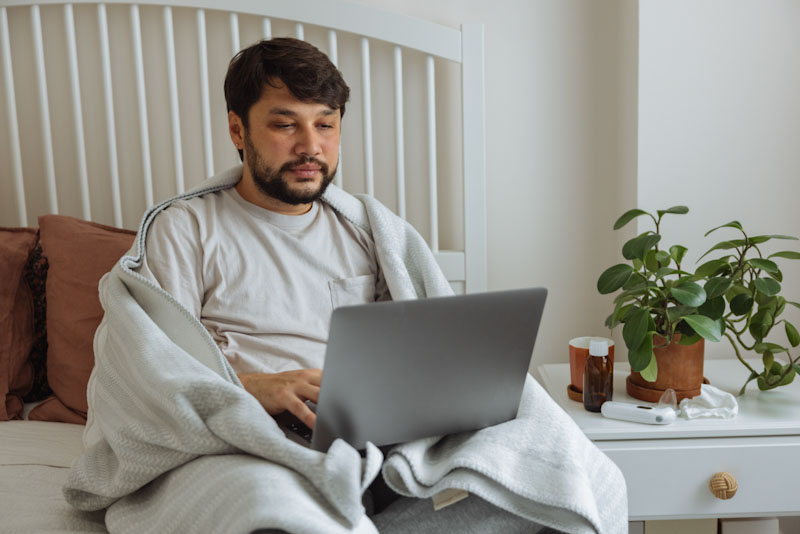Should you work from home when you are sick?
Published by MAXSolutions on October 20, 2024

Many people understand that going to work while sick is a terrible idea. It increases the likelihood of transmitting your illness to others, hinders your own healing process and chances are that you won’t be able to perform well at work.
Research indicates that showing up at work while sick, increases the risk of requiring extended sick leaves in the future1. Taking brief sick leaves when unwell results in requiring less time off in the long run. Another study has revealed that working while sick enhances the probability of suffering from depression2. Therefore, it's clear that not reporting to work when sick is advisable.
However, does this imply that you should opt to work from home if your job permits? Experts say it depends2. At times, individuals might be too sick to even work from home. If there are instances of people choosing to work from home instead of resting and recuperating, they might feel obligated to work when they should not. On the other hand, the flexibility to work from home can aid individuals dealing with chronic health issues, allowing them to remain in the workforce for a longer period.
A comprehensive study that tracked 16,000 employees discovered that working from home resulted in a 13% rise in work performance, enhanced job satisfaction and reduced employee turnover. Some productivity increase was attributed to people working from home while sick. When compared to those mandated to be physically present at the office, it was concluded that those working from home took fewer sick leaves as they found it feasible to work from home while sick.
Employees often find that they can be quite productive when working from home with a mild illness. However, while this may seem beneficial, it is crucial to encourage employees to completely take time off work if they are seriously sick to ensure they recuperate. It is vital to enable employees to make decisions that suit their needs so they can maintain their health, recover from sickness and contribute at work.
References
[1.] Janssens H, Clays E, De Clercq B, De Bacquer D, Braeckman L. The relation between presenteeism and different types of future sickness absence. J Occup Health. 2013;55(3):132-41. doi: 10.1539/joh.12-0164-oa. Epub 2013 Mar 13. PMID: 23485571.
[2.] Conway PM, Hogh A, Rugulies R, Hansen ÅM. Is sickness presenteeism a risk factor for depression? A Danish 2-year follow-up study. J Occup Environ Med. 2014 Jun;56(6):595-603. doi: 10.1097/JOM.0000000000000177. PMID: 24854252.
[3.] Bloom, N. A.; Liang, N.; Roberts, J.; Zhichun, J. Y.; 2014, Does Working from Home Work? Evidence from a Chinese Experiment. https://doi.org/10.1093/qje/qju032
Share
Tags
Found this useful?
Help and advice
Our blogs are about helping people seek the information that they need for their steps in the workforce.














_1.jpg)





























.jpeg)

















